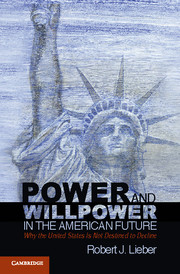Book contents
4 - Threats to Persistent Primacy and the Rise of Others
Published online by Cambridge University Press: 05 June 2014
Summary
“A world without U.S. primacy will be a world with more violence and disorder and less democracy and economic growth than a world where the United States continues to have more influence than any other country in shaping global affairs. The sustained international primacy of the U.S. is central to the welfare and security of Americans and to the future of freedom, democracy, open economies, and international order in the world.”
– Samuel H. HuntingtonArguments about the American era at home and abroad involve two propositions. Those who make the case for American decline assert, first, that the United States itself as a society, an economy, and a political power is weakening or has even become enfeebled; and second, that its international primacy is ebbing because of the rise of other powers. Previous chapters have focused on the domestic basis for American power and influence. This chapter now turns to the international dimension. In doing so, it is essential to think broadly, rigorously, and long-term, yet it is sobering to consider how varied and volatile previous and even recent assessments have been. Observers at home and abroad have periodically offered pessimistic and even dire assertions about America. In hindsight, after many years or often after even a very brief interval, these predictions have proved to be far too pessimistic, even embarrassingly so. In seeking to make sense of threats to American primacy, whether in terms of the diffusion of power or the more direct types of external dangers or internal weaknesses, many in the political world, the academy, and the media have fallen prey to the declinist temptation.
- Type
- Chapter
- Information
- Power and Willpower in the American FutureWhy the United States Is Not Destined to Decline, pp. 80 - 117Publisher: Cambridge University PressPrint publication year: 2012



